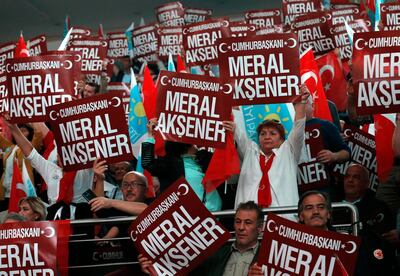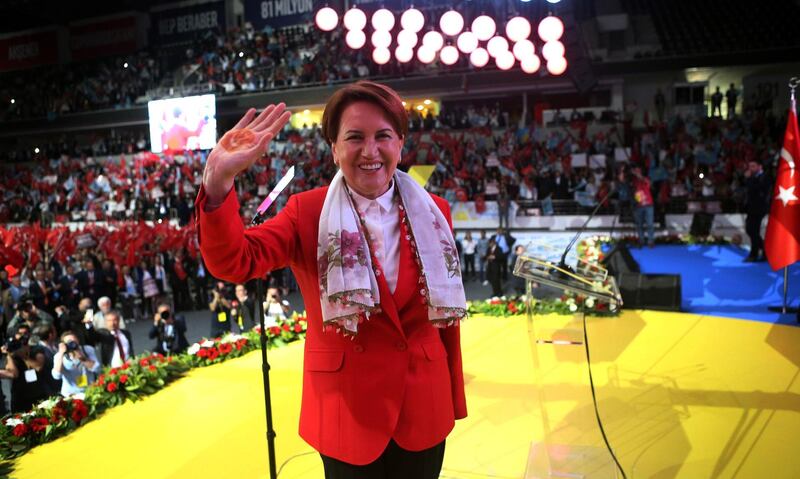Meral Aksener burst out laughing when asked why President Recep Tayyip Erdogan rarely mentions her in his speeches and routine attacks on candidates running against him in Turkey’s presidential election.
The former interior minister and leader of a new political party, who is bidding to become Turkey’s first female president, was hosting a dozen foreign journalists weeks into the election campaign to talk about her reform plans for a nation shaken by economic turmoil and polarisation, ailing democratic norms and freedom of expression, and a growing rift with its traditional western allies.
But the president’s seemingly deliberate effort to pretend she does not exist amused her no end.
“Mr Erdogan chooses his own competitors, and places them in a certain framework,” she said. “I don’t fit that profile - my gender, my experience, my age … He would be unable to bring himself to compete with a woman [because of] his ego.”
Less than a month from arguably the most important elections in modern Turkish history, credible challengers have emerged to President Erdogan’s rule. Though still the most popular and powerful politician in Turkey, he faces the possible loss of his party’s majority in the legislature and a run-off in the presidential race.
The largest opposition bloc, the secularist Republican People’s Party (CHP) has fielded the former physics teacher Muharrem Ince, who has performed vastly better than expected and has challenged long-standing secularist taboos, including pledges to resolve Turkey’s long-running Kurdish insurgency peacefully and hints of personal religiosity.
The other main presidential candidate is Ms Aksener, who founded her own Iyi (Good) Party after breaking away from former nationalist allies who embraced Mr Erdogan.
Selahattin Demirtas, the charismatic leader of the pro-Kurdish People’s Democratic Party (HDP), once dubbed the Kurdish Obama, is running for president from his prison cell while he awaits trial on terrorism charges.
Ms Aksener announced her party’s manifesto on Wednesday, pledging to fight pay inequality, raise salaries of some public employees, fight corruption and to restructure the debts of citizens burdened by credit-card bills.
She also pledged to dismantle the new presidential system that was narrowly approved in a referendum last year, which grants extraordinary powers to the president, and restore parliamentary democracy in Turkey.
She will also seek to restore Ankara’s relations with key allies such as the European Union, pledging to revive a dormant EU accession process whose virtual death has pushed Turkey away from the western bloc and closer to traditional rivals like Moscow.
In meetings with foreign journalists, she has also repeatedly pledged to restore democracy and the rule of law in Turkey, and to halt the prosecutions of dissidents and journalists. Under the leadership of Mr Erdogan’s Justice and Development party (AKP), Turkey has become the world’s leading jailer of journalists, and thousands of judges and civil servants have been dismissed or arrested over alleged links to Fethullah Gulen, an exiled preacher based in the US whose followers are accused of orchestrating a coup attempt in the summer of 2016.
The crackdown, under a state of emergency that has lasted nearly two years and will continue through the election campaign, has gone beyond Gulenists in the state apparatus to encompass other dissidents. Opposition candidates including Ms Aksener have pledged to lift the state of emergency and end undue influence over the judiciary.
“Turkey needs to end the doubts about free trials, and the law needs to be applied to everyone equally,” she said. “We want a just judiciary system that no one says 'oops sorry they were innocent ', this is the first thing we will work on when we are the government.”
In a nod to women’s rights campaigners who have long condemned high rates of violence against women in Turkey, Ms Aksener pledged to build therapy centres that would house husbands who commit domestic violence, rather than sending abused women to shelters.
Her Iyi party is running for parliament in a coalition with Mr Ince’s CHP. If they perform as expected, and the HDP earns sufficient votes nationwide to enter parliament, they are likely to end the ruling party’s majority.

The daughter of immigrants who arrived in Turkey in the 1920s after the population exchanges with Greece following the War of Independence, Ms Aksener presided over the interior ministry for eight months from November 1996, during some of the worst human rights abuses in Turkey's Kurdish regions. She is known among supporters as "asena", or she-wolf, a potent symbol of the nationalist right in the country.
But she has distanced herself from the abuses that took place under her leadership, and sought to position her Iyi party as distinct from the right-wing nationalist movements sweeping Europe and the US. She has held several rallies in Kurdish-majority areas and called for Mr Demirtas’s release so he can campaign freely, and deliberately avoided vilifying Syrian refugees, 3 million of whom are hosted by Turkey.
“We do not adopt the discourse of hostility towards refugees,” she said. “We do not have an attitude of pushing the refugees out, but we cannot ignore the fact that the West sees Turkey as a country of refuge.”
She added: “We believe that a strong and independent Syria and Iraq without meddling in their internal affairs leads to a powerful Turkey as well. What we expect after we come to power is, after restoring security and the system there, to open a path so they can happily live in their homeland.”
_______________
Read more:
[ From high-security prison cell, Erdogan rival questions legitimacy of the election ]
[ Erdogan's election travels expose challenge at home ]
[ IMF's Christine Lagarde: Turkey central bank must stay independent ]
_______________
Polls in Turkey are notoriously unreliable, but most show that Mr Erdogan is likely to win the first and second-round contests. In the first round, Mr Ince comes second and Ms Aksener third, meaning the former is likely to make it to the run-off. But Ms Aksener says internal polls show that she can defeat Mr Erdogan in a second-round contest and is currently within striking distance of him in opinion polls if they were running only against each other.
The outcome will largely depend on which candidate can rally the opposition behind them while drawing in dissatisfied Erdogan voters. Mr Ince has aggressively courted Kurdish voters, even espousing that schools in majority-Kurdish areas be allowed to teach in their native language.
Despite her energetic campaign, visiting more than 60 cities in six months, observers still question whether Ms Aksener’s nationalist credentials and past role in government will allow her to draw Kurdish voters.
But she may be well-positioned to siphon away some conservatives and nationalists. In her rallies she has railed against corruption and the marginalisation of Turkish workers by the ruling elite, and while espousing the secular ideals of Turkey’s founder Mustafa Kemal Ataturk, has deliberately portrayed herself as personally a devout Muslim who prays regularly and performed the Hajj. Such an image could help sway disaffected AKP voters who nevertheless distrust the country’s "white Turks" — secular elites who for decades ostracised their more religious countrymen.
Still, she and other opposition parties face an uphill battle in an environment where Mr Erdogan and his party control all the levers of power.
“Yes the conditions are not fair, one side has the power of the presidential title, defines himself as the state and pushes all the economic power of it to the field,” said Ms Aksener. “The other side goes to elections with only the belief and trust to win of its supporters.”







